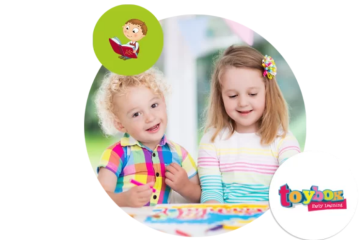As parents and caregivers, selecting toys for preschoolers involves more than just entertainment. The right toys can lay the foundation for crucial developmental skills. From enhancing fine motor abilities to nurturing social interaction, here are ten top picks for preschool toys that promote holistic development:
Building Blocks
Building blocks are timeless toys that encourage creativity, problem-solving, and fine motor skills. Toddlers can build structures, learn about shapes and colors, and develop spatial awareness through stacking and balancing. As they experiment with different combinations, they learn basic principles of engineering and physics in a hands-on way. Aside from fostering creativity and problem-solving, building blocks also help improve hand-eye coordination, spatial awareness, and concentration.
Puzzles
Puzzles are excellent for enhancing cognitive skills and hand-eye coordination. Choose age-appropriate puzzles with varying levels of difficulty. They teach patience and persistence while offering a sense of accomplishment upon completion. Puzzles also improve visual-spatial reasoning as children figure out how pieces fit together. Solving puzzles enhances cognitive abilities such as pattern recognition, memory recall, and logical thinking. It also boosts fine motor skills as children manipulate puzzle pieces.
Musical Instruments
Musical toys like tambourines, xylophones, or simple keyboards introduce children to rhythm, melody, and sound exploration. Musical play supports language development and can be a fun outlet for self-expression. Moreover, it encourages listening skills and fosters an appreciation for music from an early age. Playing musical instruments promotes auditory discrimination, rhythm comprehension, and coordination. It can also enhance language skills through exposure to different sounds and melodies.
Playdough
Playdough encourages sensory exploration and fine motor development. Children can mold, squish, and shape dough to create endless imaginative creations while strengthening their hand muscles. It’s also a therapeutic activity that allows preschoolers to express emotions and feelings through tactile play. Manipulating playdough strengthens hand muscles, refines finger dexterity, and provides a sensory experience that supports tactile sensitivity.
Dress-Up Clothes
Dress-up costumes spark imaginative play and role-playing. They help children explore different roles and develop social skills by encouraging interaction and storytelling. Dressing up allows preschoolers to experiment with identities and understand different perspectives, boosting empathy and creativity. Role-playing with dress-up clothes encourages language development, social interaction, and emotional intelligence as children act out scenarios and take on different roles.
Art Supplies
Stock up on child-safe art materials like crayons, washable markers, and non-toxic paints. Artistic activities promote self-expression, creativity, and fine motor coordination. Preschoolers can explore colors, textures, and shapes while improving hand-eye coordination and attention to detail. Art activities foster self-expression, boost self-esteem, and encourage problem-solving and decision-making skills as children experiment with different mediums.
Picture Books
Choose engaging picture books with colorful illustrations and simple text. Reading together promotes language development, literacy skills, and a love for books. It also encourages bonding between children and caregivers, fostering a positive association with reading and learning. As they grow, you can introduce them to more advanced items, like the best Lorcana starter deck, a fantastic collectible card that can spark a love for strategy and storytelling.
Outdoor Toys
Include outdoor toys like a tricycle, ball, or sandbox tools. Outdoor play enhances gross motor skills, encourages physical activity, and exposes children to nature. Playing outdoors also offers opportunities for sensory exploration and imagination, away from screens and technology. Outdoor play not only promotes physical fitness but also supports gross motor development, spatial awareness, and sensory exploration. It offers a break from indoor routines and encourages imaginative play.
Educational Games
Look for games that teach counting, matching, or memory skills. These games make learning fun and foster cognitive development through play. Educational games encourage problem-solving abilities and critical thinking while reinforcing academic concepts in an engaging way. They combine learning with play, making academic concepts more accessible and enjoyable. They also encourage strategic thinking, turn-taking, and cooperation.
Building Sets
Invest in more complex building sets like magnetic tiles or LEGO Duplo. These toys promote problem-solving, engineering skills, and cooperative play. Children learn to follow instructions, plan, and execute their ideas while working together with peers to build and create. More complex building sets challenge problem-solving abilities, encourage creativity, and facilitate collaboration when working on larger projects.
Choosing the Right Preschool Toys
When selecting toys for preschoolers, keep these tips in mind:
· Safety First: Ensure toys are age-appropriate and free from small parts that could pose a choking hazard. Check for sturdy construction and non-toxic materials.
· Open-Ended Play: Opt for toys that encourage creativity and imagination, allowing children to play in different ways. Avoid toys that have a single, predetermined use.
· Multi-Sensory: Choose toys that stimulate multiple senses, such as touch, sight, and sound, supporting overall sensory development. This includes toys with different textures, colors, and sounds.
· Educational Value: Look for toys that align with developmental milestones, offering opportunities for learning through play. Consider toys that introduce concepts like numbers, letters, shapes, and colors.
· Social Interaction: Select toys that promote sharing, turn-taking, and cooperative play, fostering social skills and empathy. Encourage group activities that require teamwork and communication.
Conclusion
Preschool toys play a vital role in a child’s early years, shaping their cognitive, social, and emotional development. By choosing toys that are both fun and educational, caregivers can create an enriching environment that supports children’s growth and learning. Whether it’s building blocks, musical instruments, or outdoor toys, each play experience contributes to a preschooler’s journey of discovery and development. Encourage a balance of different types of toys to provide a well-rounded play experience that nurtures creativity, problem-solving skills, and social interaction. Take time to observe children’s interests and preferences to tailor toy choices to their individual developmental needs. By fostering a love for learning through play, caregivers empower preschoolers to explore, discover, and thrive in their early years.




